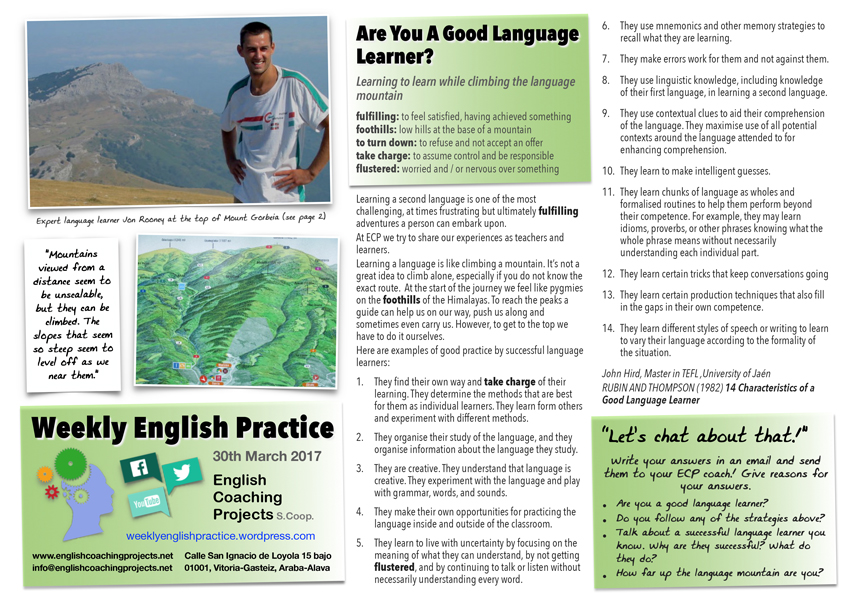Click on the image to download the pdf
Learning to learn while climbing the language mountain
Vocabulary. Read and check you understand this before you read and listen to the article:
fulfilling: to feel satisfied, having achieved something
foothills: low hills at the base of a mountain
to turn down: to refuse and not accept an offer
take charge: to assume control and be responsible
flustered: worried and / or nervous over something
Learning a second language is one of the most challenging, at times frustrating but ultimately fulfilling adventures a person can embark upon.
At ECP we try to share our experiences as teachers and learners.
Learning a language is like climbing a mountain. It’s not a great idea to climb alone, especially if you do not know the exact route. At the start of the journey we feel like pygmies on the foothills of the Himalayas. To reach the peaks a guide can help us on our way, push us along and sometimes even carry us. However, to get to the top we have to do it ourselves.
Here are examples of good practice by successful language learners:
- They find their own way and take charge of their learning. They determine the methods that are best for them as individual learners. They learn form others and experiment with different methods.
- They organise their study of the language, and they organise information about the language they study.
- They are creative. They understand that language is creative. They experiment with the language and play with grammar, words, and sounds.
- They make their own opportunities for practicing the language inside and outside of the classroom.
- They learn to live with uncertainty by focusing on the meaning of what they can understand, by not getting flustered, and by continuing to talk or listen without necessarily understanding every word.
- They use mnemonics and other memory strategies to recall what they are learning.
- They make errors work for them and not against them.
- They use linguistic knowledge, including knowledge of their first language, in learning a second language.
- They use contextual clues to aid their comprehension of the language. They maximise use of all potential contexts around the language attended to for enhancing comprehension.
- They learn to make intelligent guesses.
- They learn chunks of language as wholes and formalised routines to help them perform beyond their competence. For example, they may learn idioms, proverbs, or other phrases knowing what the whole phrase means without necessarily understanding each individual part.
- They learn certain tricks that keep conversations going
- They learn certain production techniques that also fill in the gaps in their own competence.
- They learn different styles of speech or writing to learn to vary their language according to the formality of the situation.
John Hird, Master in TEFL ,University of Jaén
RUBIN AND THOMPSON (1982) 14 Characteristics of a Good Language Learner
“Let’s chat about that!”
Write your answers and send them by email to your ECP coach. Why not record your voice too? Listen to yourself speak and identify what you have to improve on 🙂
Give reasons for your answers.
- Are you a good language learner?
- Do you follow any of the strategies above?
- Talk about a successful language learner you know. Why are they successful? What do they do?
- How far up the language mountain are you?


